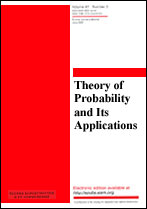|
This article is cited in 6 scientific papers (total in 6 papers)
Short Communications
Integral Equations and Phase Transitions in Stochastic Games. An Analogy with Statistical Physics
V. P. Maslov
A. Ishlinsky Institite for Problems in Mechanics, Russian Academy of Sciences
Abstract:
Maximization of the Kullback–Leibler information is known to result in general Esscher
transformations. The Bose–Einstein and Fermi–Dirac statistics in a probability space $(\Omega,
\mathcal{F},P)$ give rise to another kind of information, namely,
$$
S_B=\int \log\bigg(1+\frac{dP}{dQ}\bigg)\,dQ+ \int \log\bigg(1+\frac{dQ}{dP}\bigg)\,dP
$$
for the Bose statistics and
$$
S_F =\int\log\bigg(\frac{dP}{dQ}-1\bigg)\,dQ -\int\log\bigg(1-\frac{dQ}{dP}\bigg)\,dP, \qquad
\frac{dP}{dQ} >1,
$$
for the Fermi statistics. This information generates measure transformations corresponding to
these statistics. In the presence of a payoff matrix, these transformations vary in accordance
with the integral equations given in the paper. We give examples of financial games corresponding
to Bose and Fermi statistics.
Keywords:
Bose statistics, Fermi statistics, payoff matrix, Esscher transformation, entropy, phase transition, integral equation, Kullback–Leibler information, thermodynamics, statistical physics, dyadic games.
Received: 17.03.2003
Citation:
V. P. Maslov, “Integral Equations and Phase Transitions in Stochastic Games. An Analogy with Statistical Physics”, Teor. Veroyatnost. i Primenen., 48:2 (2003), 403–411; Theory Probab. Appl., 48:2 (2004), 359–367
Linking options:
https://www.mathnet.ru/eng/tvp294https://doi.org/10.4213/tvp294 https://www.mathnet.ru/eng/tvp/v48/i2/p403
|


| Statistics & downloads: |
| Abstract page: | 828 | | Full-text PDF : | 220 | | References: | 143 |
|




 Contact us:
Contact us: Terms of Use
Terms of Use
 Registration to the website
Registration to the website Logotypes
Logotypes








 Citation in format
Citation in format 
